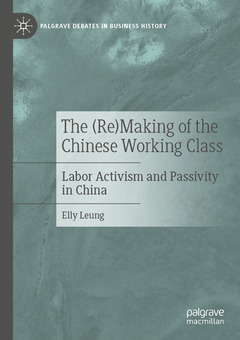Chapter One: Introduction
This chapter will present an overview of workers’ status and the debates of labour activism in contemporary China. It will review how extant studies have been influenced by Thompson’s agency-oriented class concept to posit the brutal work-based experiences as a specific foundation for stimulating workers’ consciousness and forming of a working class to act against the prolonged exploitative and abusive conditions. The chapter will also present alternative studies (Chan & Siu 2012; Cooke, Xie & Duan 2016; Deng & Benney 2017; Franceschini, Siu & Chan 2016; Lin 2019; Perry 1996; 2009) that have examined how workers’ protest behaviours in China have instead reflected their submissiveness to the workplace authorities, and hence the Chinese State, regardless of their work-based experiences as a class. The problems with class analysis on the relations between work-based experiences and labour activism have thereby led this study to explore how the work and non-work-based experiences (or lived experiences) that are grounded in the cultural and historical experiences have also influenced the development of worker consciousness and the formation of a working class. In so doing, this study asks:
a) How has worker consciousness been shaped in China?
b) How does the shaping of worker consciousness affect labour activism by Chinese workers?
c) How does the shaping of worker consciousness affect their ability to develop themselves into an organized labour movement to improve living and working conditions for themselves?
This chapter will also discuss the research processes of ethnographic data collection that has been used to explore the research focus across different industries and locations in China.
Chapter Two: The Government of the Selves
Presenting an alternative view to understand workers’ consciousness requires different theoretical lens. The chapter thus begins with discussing how Foucault (1980a; 1982; 1987; 1997; 2014) uses history as a tool to question and analyse the problems of the development of thought, and to explore the forces of control that are exercised externally and internally upon individuals to guide their behaviour in the present day (or the History of the Present).
Chapter Three: The (Re-) Making of a Chinese Working Class
The chapter elaborates upon this discussion by applying Foucault’s genealogical method (or the History of the Present) to explore how worker consciousness has been shaped by the power-knowledge relations in successive historical periods since the Zhou dynasty (13th century B.C.E.) in China. The chapter shows how the Chinese State fostered the production and reproduction of a Chinese working class by revitalising the Confucian constitutive elements to construct workers’ experiences of their existence to uphold the Confucian-orthopraxy (standardisation or proper behaviour) system within China’s thought management.
Chapter Four: Automatic Docility in Market Socialism
This chapter presents the two phases of original field data elicited from 53 everyday workers in Group One – who had never engaged in any protest activities – that were gathered at a wide range of industries and occupations in multiple locations of China between 2011 and 2014. The chapter illustrates that, while the workers in this group had experienced prolonged exploitative conditions, their discourses reflected that the possibility of class consciousness development and class formation was undermined by the ‘social truth’ about in the hierarchical relationships. This particular ‘self-knowledge’ reflects the effectiveness of Chinese governmentality in the making of automatic docile bodies and minds to serve the interests of their employers and the Chinese State.
Chapter Five: ‘Beyond’ the Selves and Reflective Docility
The chapter analyses the two phases of empirical data elicited from 21 everyday workers in Group Two – who had engaged in protest activities – that was collected at multiple locations, mainly through contacts with non-governmental labour organisations (or labour NGOs) in Hong Kong and Guangzhou Province in China between 2011 and 2014. This body of data illustrates that, while protest activities by this group of workers have seemingly opened up a space of possibility to transform the way they relate to themselves and to each other and to their conditions, these ‘possibilities’ are confined by their cultural knowledge within the ‘social truth’ about themselves. Thus, while the experiences of these workers have incited them to engage in protest activities, their actions are grounded in their immediate economic needs, and limited to ‘prescribed’ conditions in accordance with their given positions. This automatic compliance demonstrates their internal willingness to become the agents of maintaining the power-knowledge framework – consciously and subconsciously – by self-regulating themselves to attain a level of internal ‘docility’ to their given status.
Chapter Six: Conclusion
This chapter will summarise major findings of this study. An important implication that emerges from this study is how the Chinese State continued to produce and internalise the “social truth” among its Chinese subjects in societies including Tibet, Xinjiang and post-colonial Hong Kong at the periphery (Human Rights Watch 2019). The chapter will conclude by reviewing Hong Kong workers’ responses to their “social truth” in the recent movements of resistance (BBC 2019) to the Chinese government.





